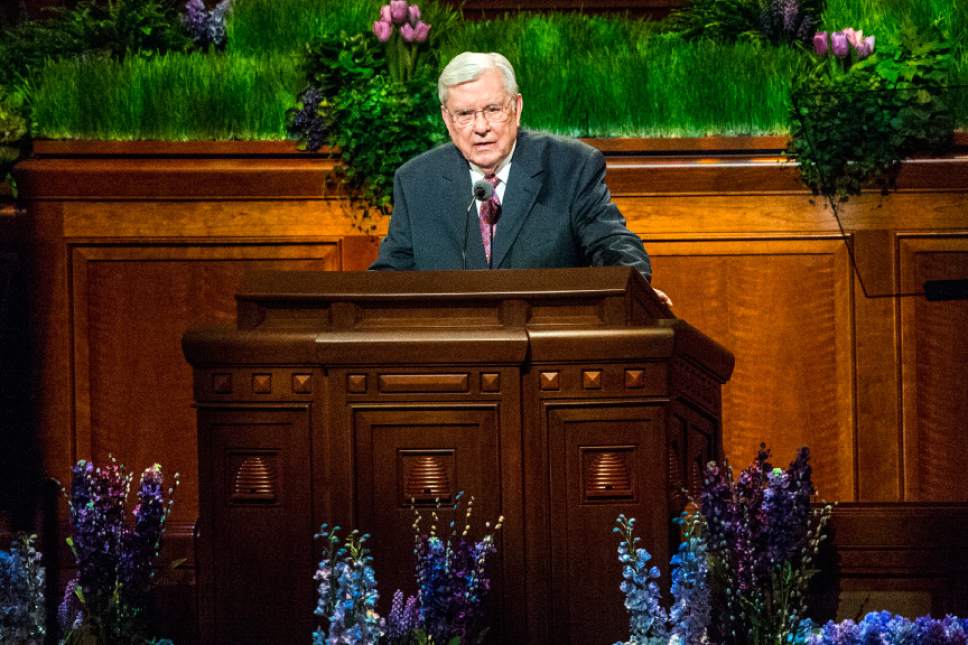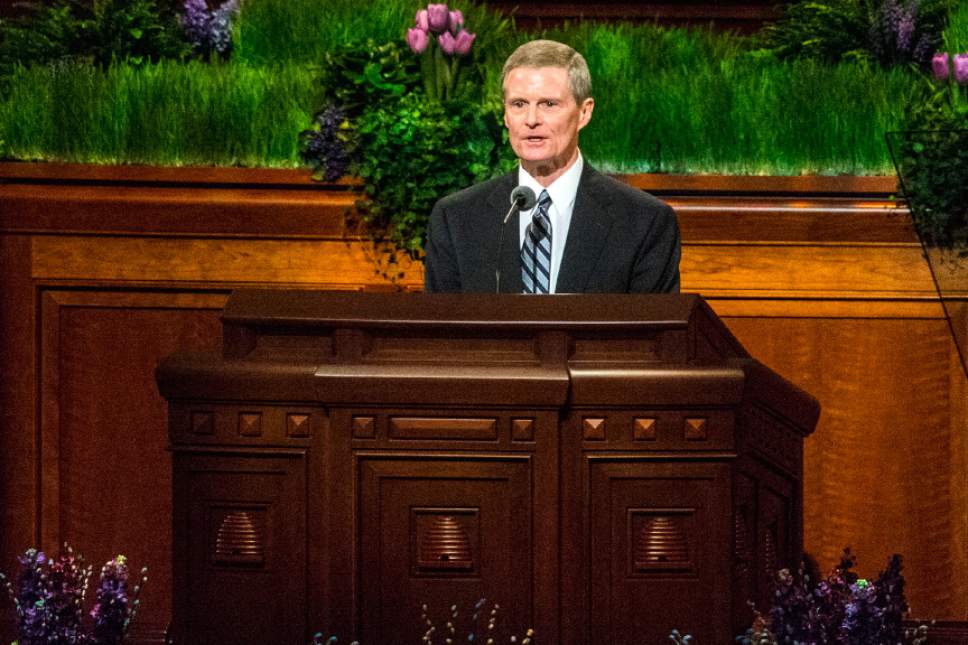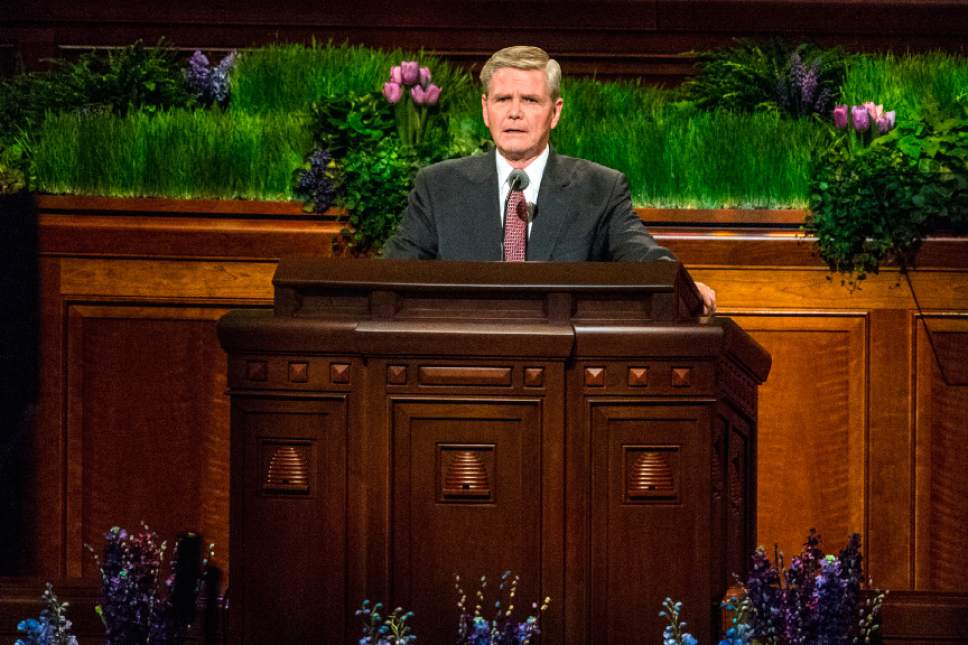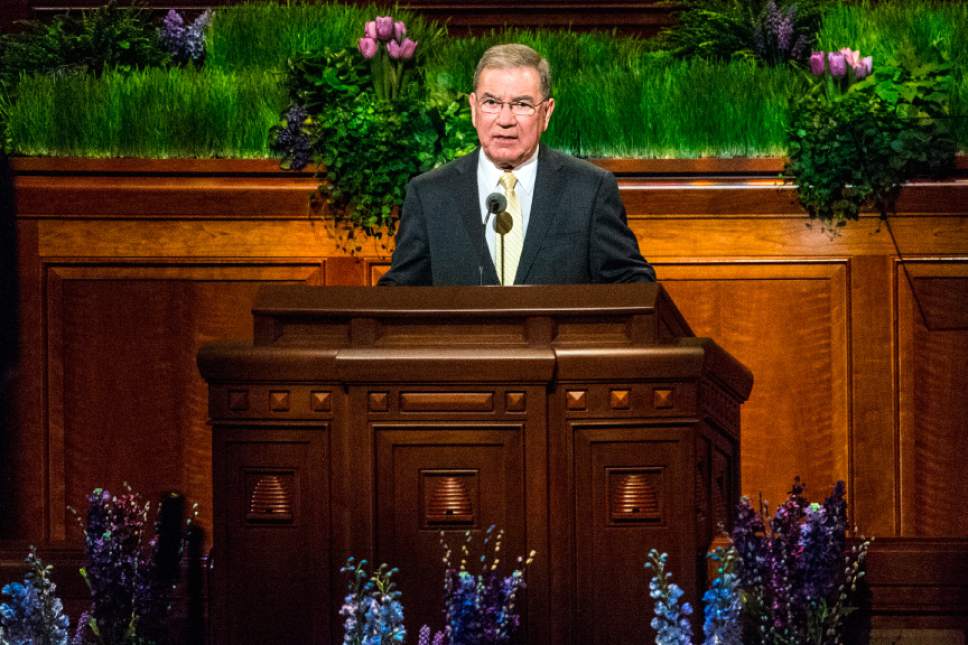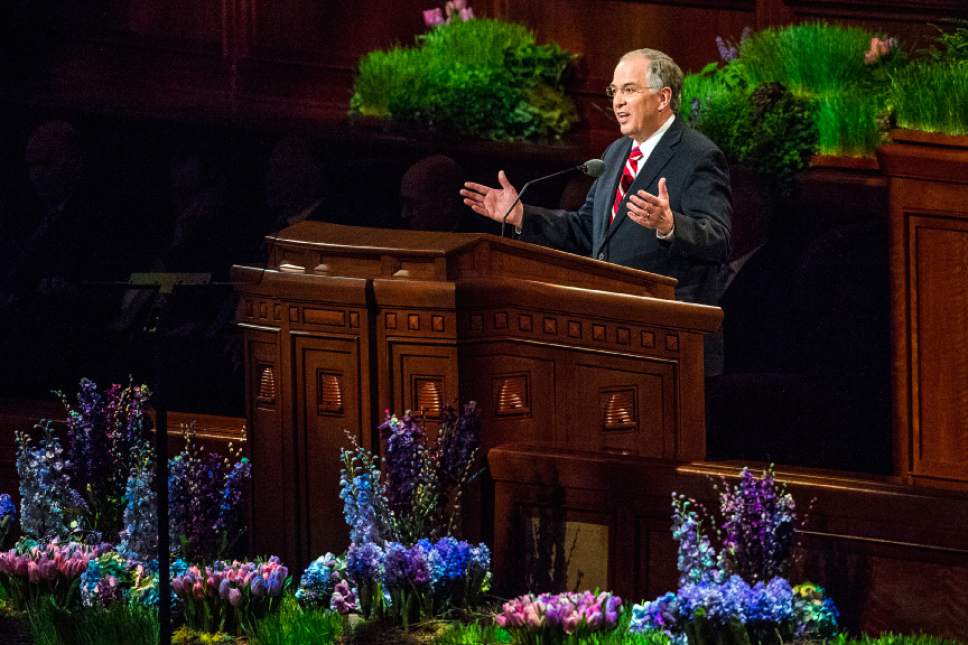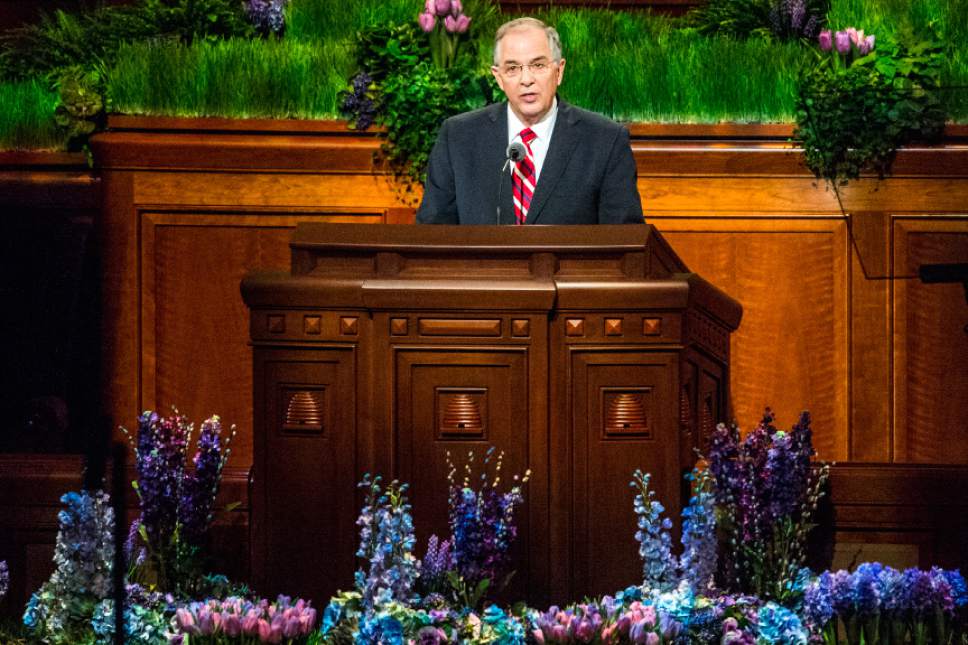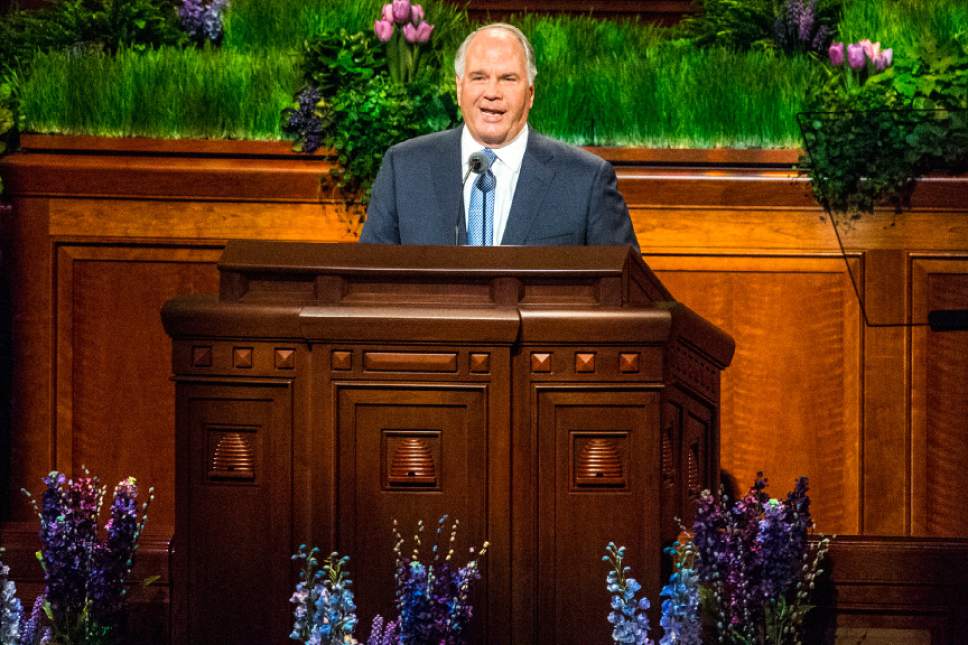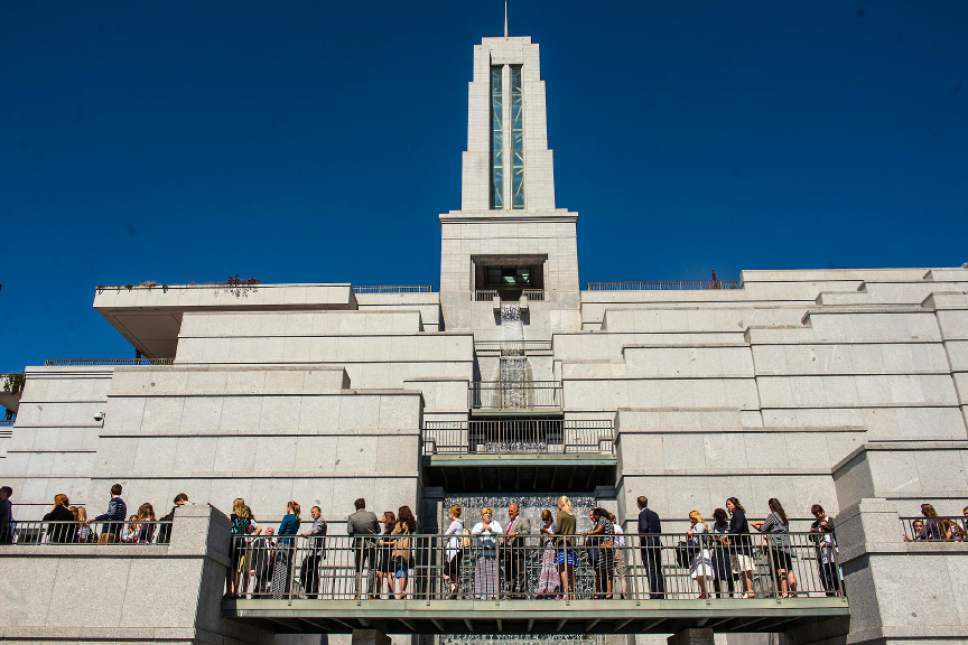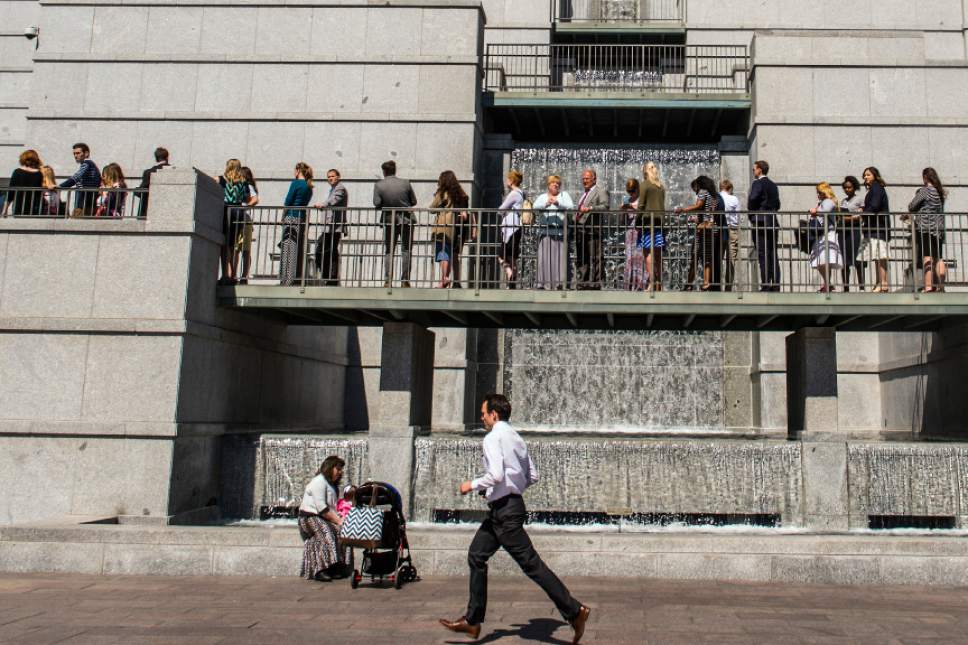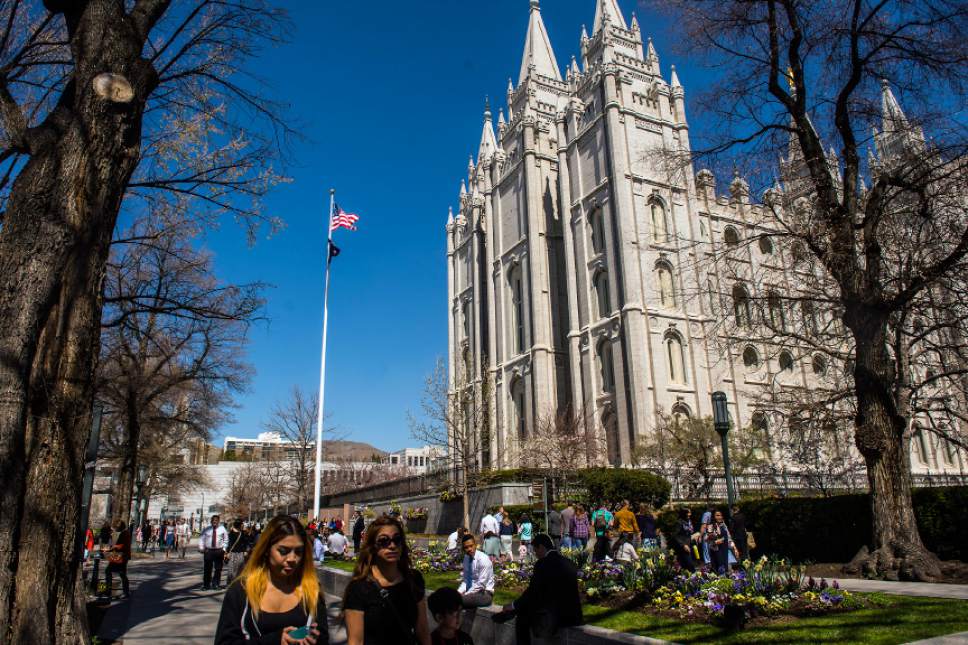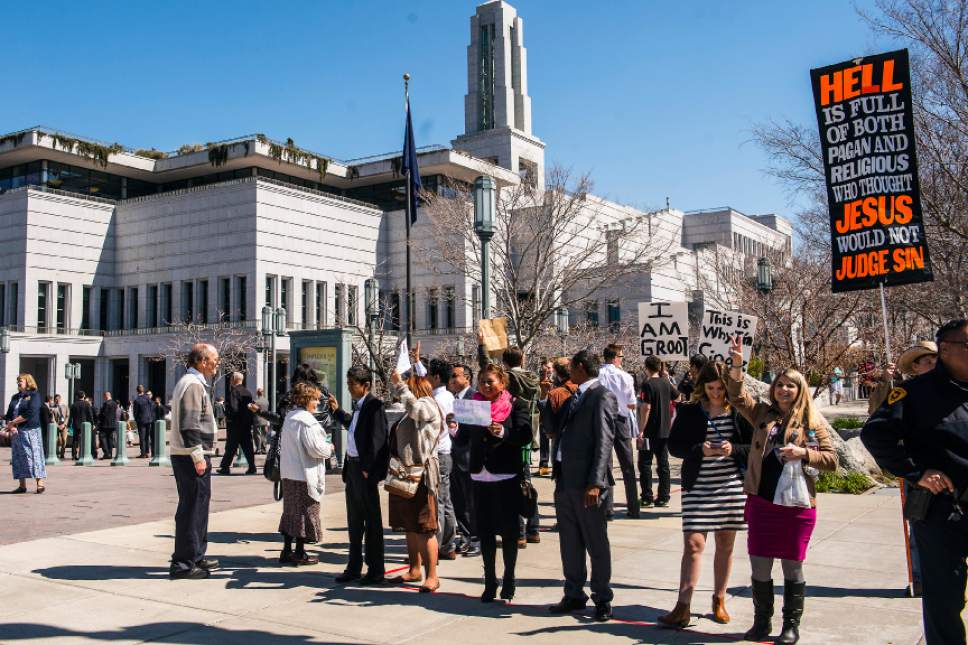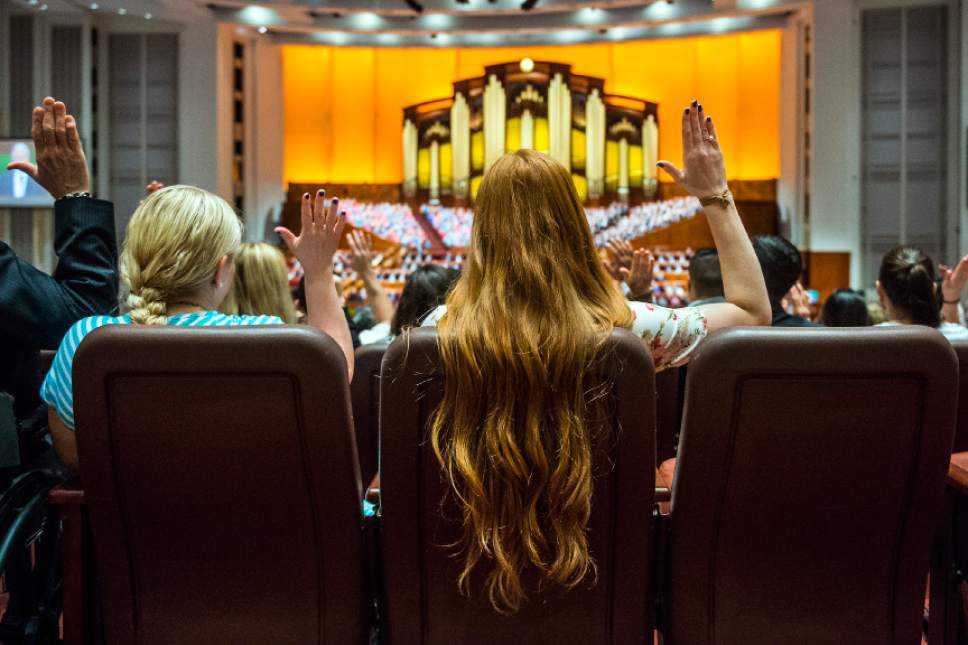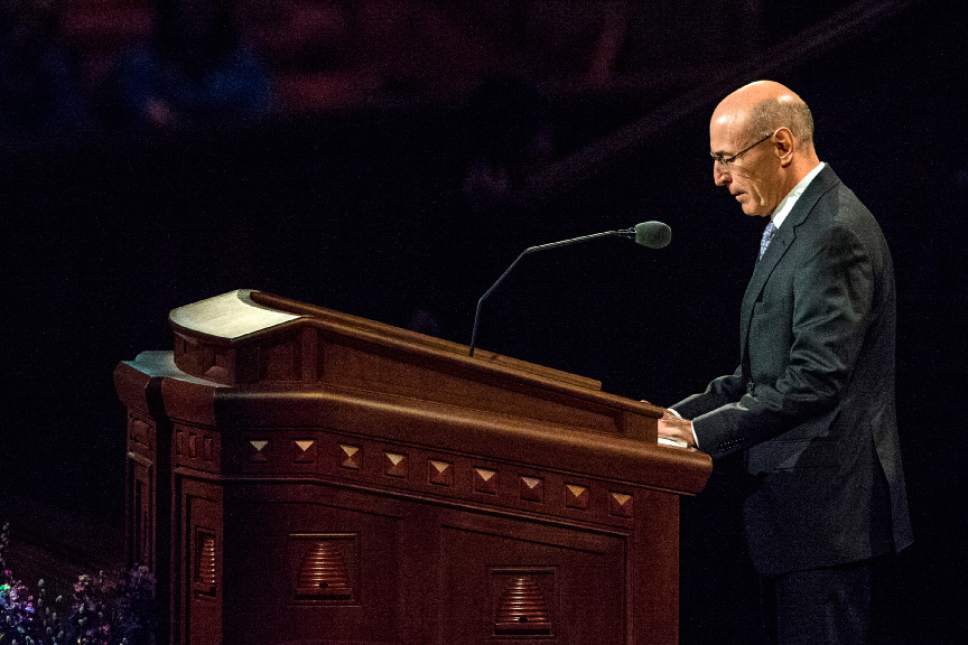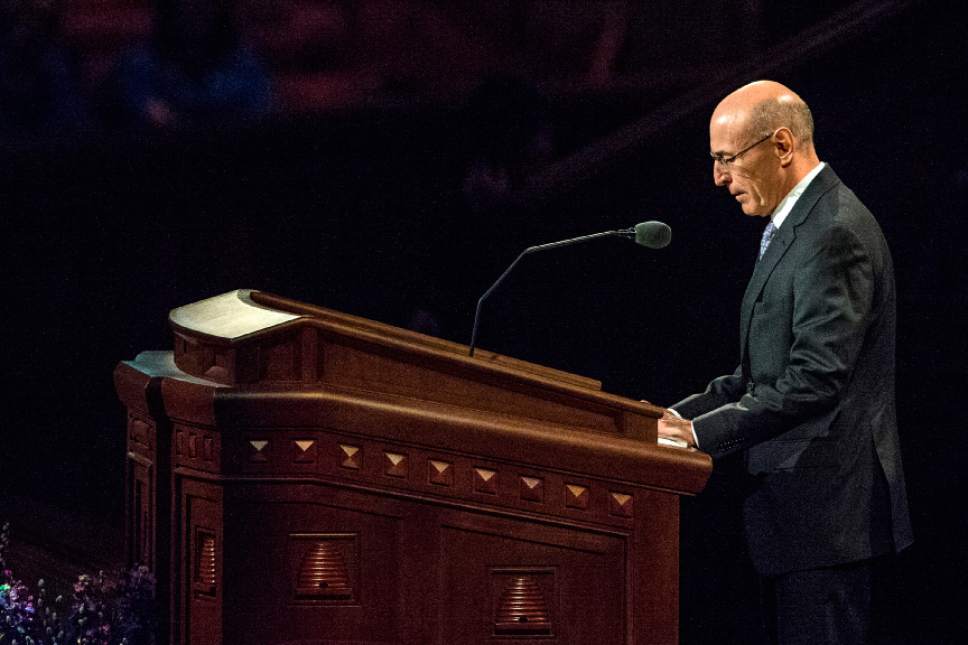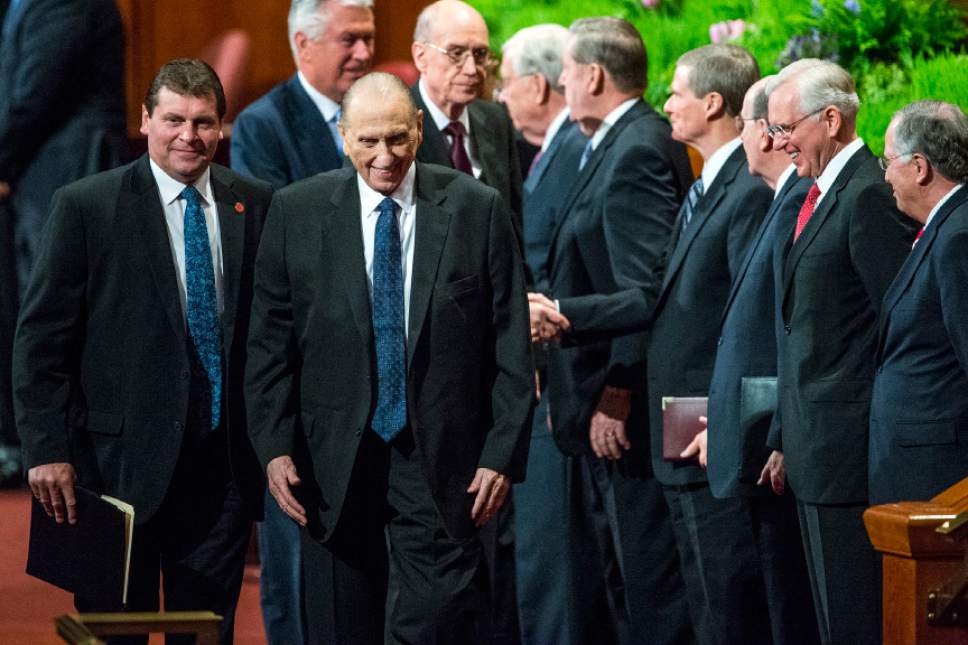This is an archived article that was published on sltrib.com in 2016, and information in the article may be outdated. It is provided only for personal research purposes and may not be reprinted.
Striking a gentle, affirming tone, Mormon authorities — including new LDS apostles added last fall — spoke Saturday of the need for humility, forgiveness, empathy and understanding of life's challenges and sorrows.
"The closer we are to Jesus Christ in the thoughts and intents of our hearts, the more we appreciate his innocent suffering, the more grateful we are for grace and forgiveness, and the more we want to repent and become like him," said Dale G. Renlund, the most junior apostle, during the 186th Annual General Conference of The Church of Jesus Christ of Latter-day Saints.
The more believers distance themselves from Christ, Renlund said in only his second conference address to the Mormon faithful, the more "entitled" they feel.
"We begin to think that we deserve grace and are owed blessings. We are more prone to look around, identify inequities and feel aggrieved — even offended — by the unfairness we perceive," Renlund said. "Ultimately, in the eternal scheme of things, there will be no unfairness. ... We are promised that 'God shall wipe away all tears.' "
That was the kind of message Henry B. Eyring, first counselor in the faith's governing First Presidency, promised Mormons they would hear in this weekend's sermons.
He noted that many who had received the Mormon message with joy, later felt that testimony weaken because of "vicious attacks" from those seeking to destroy their faith or from Satan telling "those he wishes to be miserable that the joy they once felt was childish self-delusion."
"If you listen with the Spirit, you will find your heart softened, your faith strengthened, and your capacity to love the Lord increased," Eyring told the thousands gathered in the giant Conference Center in downtown Salt Lake City or the millions more watching around the globe. "Your choice to pray with full purpose of heart will transform your experience in the conference session in the days and months that follow."
President Thomas S. Monson, the 88-year-old leader of the 15.6 million Mormons worldwide, personally presided over Saturday's meetings.
The 20,000-plus members filling the center for each session stood to honor him as he walked to his place on the stand. Latter-day Saints view Monson, who the church has previously said is "feeling the effects of advancing age," as a "prophet, seer and revelator."
Two of the faith's 12 apostles — Dallin H. Oaks and Robert D. Hales — were not in their regular red seats Saturday morning, although Oaks was present for the Saturday afternoon session. In the afternoon, another apostle, Jeffrey R. Holland, was absent, as was Hales.
They were "assigned elsewhere," church spokeswoman Kristen Howey said, but declined to name where.
Hales has suffered serious health challenges for a number of years and has been absent from LDS conference sessions on previous occasions.
During the "sustaining" votes of high-level church officials by members Saturday afternoon, a few congregants in the Conference Center loudly voiced opposition. Monson's second counselor, President Dieter F. Uchtdorf, calmly noted those no votes and asked those in opposition to meet with their stake presidents, who are regional lay LDS leaders.
The Utah-based faith also announced worldwide Mormon membership, as of Dec. 31, 2015, at 15,634,199 — an increase of 261,862, or 1.7 percent, from the previous year.
That is the lowest percentage rise since 1937, according to independent LDS demographer Matt Martinich.
Mormon listeners seemed delighted by the words of their newest apostle.
Renlund told a story of a women who was accidentally missed in the distribution of the weekly sacrament, or communion. A fellow Latter-day Saint noted the omission and informed her bishop, who sent young deacons to give her the water and bread later in a separate room.
One takeaway of that story, wrote Frank McIntyre on the Mormon blog Times & Seasons, was that "we can and should give leaders information to help them correct mistakes. We just need to do it with the right attitude. 'Don't be whiners' does not mean 'never speak up.' It means speak up with humility and charity and for the right reasons."
That approach would "probably help ease a lot of the friction for people who feel that leaders don't listen to them," McIntyre wrote. "Or for those leaders who (incorrectly) think they should not be ever told about their potential mistakes."
Here are highlights from Saturday's speakers:
MORNING SESSION
Mary R. Durham • The second counselor in the outgoing general presidency for Primary, the organization for Mormon children, urged parents to teach youngsters how to feel for themselves guidance by God and the spirit.
"Children have a natural desire to do good and to be good," she said. " ... They also have a great sensitivity to the still, small voice."
One way to help children receive more guidance is to "bring to our children's attention when they are hearing and feeling the spirit."
Also, "We can prepare our homes and our children to feel the still, small voice." Like many teachers believe the best way to teach foreign language is through immersion programs, Durham urged similar spiritual immersion "where spiritual principles can form the basis for daily living."
Finally, she urged helping children to "understand how the spirit speaks to them."
Donald L. Hallstrom • The member of the Presidency of the Seventy urged people not to forget whom they really are: children of God.
"This doctrine is so basic, so oft stated, and so instinctively simple that it can seem to be ordinary," he said, "when in reality it is among the most extraordinary knowledge we can obtain."
He noted that Latter-day Saints often sing a hymn titled "I Am a Child of God." But, he questioned, "Do we really know it? Do we know it in our mind and in our heart and in our soul? Is our heavenly parentage our first and most profound identity?"
LDS theology holds that humans are spirit children of a Heavenly Father and Heavenly Mother.
He said gaining that heartfelt knowledge will help through life's difficult times.
"When difficult things occur in our lives, what is our immediate response? Is it confusion or doubt or spiritual withdrawal? Is it a blow to our faith?" Hallstrom asked. " ... Or is our first response to remember who we are — that we are children of a loving God? Is that coupled with an absolute trust the he allows some earthly suffering because he knows it will bless us, like a refiner's fire, to become like him and to gain our eternal inheritance?"
He added, "It is essential that our pre-eminent identity is as a child of God. Knowing that will allow our faith to flourish, will motivate our continual repentance, and will provide the strength to be steadfast and immovable throughout our mortal journey."
Gary E. Stevensen • Giving his second General Conference address after being named an apostle last October — one of three named to the Quorum of the Twelve last fall — Stevenson said God gave his full authority (or keys of the priesthood) to the church to help transport people on their journey home to heavenly parents.
He told about a skiing trip when he lost the keys to his car, and his family was stranded, shivering in a cold parking lot.
"Without keys, this wonderful miracle of engineering was little more than decorative art," Stevenson said. "Even though the car had great potential, without keys it could not perform its intended function."
He said God restored the keys to direct his church to Mormon founder Joseph Smith, and the LDS prophets who succeeded him. "Never, ever again do we have to question, 'Where are the keys?' "
Stevenson urged Mormons to use the priesthood keys to bless lives. He urged three ways to do that: "Attend the temple, prepare for missionary service, and go forward with faith."
Kevin R. Duncan • The member of the Seventy said forgiving others will bring healing to ourselves — and part of that is developing tolerance by listening to people of diverse religious, political or other backgrounds.
"In our shortsightedness we may sometimes find it easy to develop resentments toward others who do not act or think the way we do. We may form intolerant attitudes based on such superficial things as rooting for opposing sports teams, holding different political views, or having different religious beliefs," he said.
"Let us all remember that God looketh not upon the color of the jersey or the political party," he said. " ... Brothers and sisters, in the competitions of life, if we win, let us win with grace. If we lose, let us lose with grace. For if we live with grace toward one another, grace shall be our reward at the last day."
Duncan added, "Just as we are all victims to the misdeeds of others at one time or another, we are also sometimes the offender. We all fall short and have need of grace mercy and forgiveness."
Duncan said God has taught us to forgive. "Even though we may be a victim once, we need not be a victim twice by carrying the burden of hate, bitterness, pain, resentment or even revenge. We can forgive, and we can be free."
Steven E. Snow • The member of the Seventy — and the church's historian — said being humble, or teachable, will bring peace and answers to prayers.
"Humility is essential to gain the blessings of the gospel," he said. "Humility enables us to have broken hearts when we sin or make mistakes, and makes it possible for us to repent."
He added, "Humility enables us to be better parents, sons and daughters, husbands and wives, neighbors and friends. On the other hand, unnecessary pride can dissolve family relationships, break up marriages and destroy friendships."
Snow advised, "Think of all the heartache you can avoid by humbling yourself to say, 'I'm sorry; that was inconsiderate of me'; 'What would you like me to do?'; 'I just wasn't thinking'; or 'I'm very proud of you.' If these little phrases were humbly used, there would be less contention and more peace in our homes."
Snow added that a humble attitude also brings answers to prayers and converts weaknesses into strengths.
AFTERNOON SESSION
Ronald A. Rasband • Another of the apostles called last October encouraged members to stand with LDS leaders to overcome dark influences of the world.
"The growing question of today is clear: Are you standing with the leaders of the church in a darkening world so that you might spread the light of Christ?" he asked.
" ... We have sustained leaders today who have, by divine inspiration, been called to teach and guide us and who are calling out to us to beware of the dangers we face each day — from casual Sabbath-day observance, to threats to the family, to assaults on religious freedom and even to disputing latter-day revelation."
Rasband said that following leaders does not mean that members should not ask questions and seek answers.
He said he learned that youths, especially, "desire to have their questions answered. Questions are an indication of a further desire to learn, to add to those truths already in place." He noted that restoration of the church "began with a youth, Joseph Smith, asking a question."
Mormons teach that Heavenly Father and Jesus Christ appeared to a 14-year-old Smith in answer to his prayers.
Neil L. Andersen • The apostle urged members to show love and care for children who do not come from "picture-perfect families."
"I speak not only of the youth who have experienced the death, divorce or diminishing faith of their parents," he said, "but also of the tens of thousands of young men and young women from all around the world who embrace the gospel without a mother or father to come into the church with them."
Andersen's sermon comes after recent controversy when the Utah-based faith announced that children of gay parents could not be baptized until they become adults, which leaders said was to decrease potential conflict in their homes. The apostle did not directly address that policy in his talk.
He did say that with "the diversity we have in the children of the church, we need to be even more thoughtful and sensitive." He counseled Mormons to use wording and approaches that are more accepting.
"While a child's earthly situation may not be ideal, a child's spiritual DNA is perfect," he said, "because one's true identity is as a son or daughter of God."
Andersen urged reaching out "to the youth who feel alone, left behind or outside the fence. Let us think about them, welcome them, embrace them, and do everything we can to strengthen their love for the savior."
Mervyn B. Arnold • The member of the Seventy said all Mormons are called to help rescue people in need.
"As we go to the rescue," he said, "God gives us power, encouragement and blessings."
He urged people not to delay, telling the story of how two ships once were lost while rescuers kept talking about the need for a plan instead of acting.
"Sometimes many weeks pass as we talk about how to help families or individuals who are in special need. We deliberate about who will visit them and the approach to take. Meanwhile, our lost brothers and sisters continue needing, and sometimes even calling and pleading for help. We must not delay."
Arnold said patience and persistence are sometimes needed — and talked about a friend who, for 25 years, refused to meet with LDS missionaries, but eventually joined the faith. "We must never give up."
He added, "No matter our age, we are all called to go to the rescue."
Jairo Mazzagardi • The Brazil native, a Seventy, told how he long researched a question, and after years received answers to study and prayers about why the LDS Church was restored in America and not elsewhere.
"If you who hear me have any questions in your heart," he said, "do not give up."
He said he kept asking and researching his question for years without finding a satisfactory answer. He thought the church may have been formed in the United States because its Constitution guaranteed religious freedom.
Mazzagardi said he finally found an answer when he took a trip to upstate New York and visited with church guides at historical sites there.
They helped him realize that the Erie Canal made the area a crossroads, which brought people of different faiths and traditions together and raised religious questions. And it was where Joseph Smith said records were buried anciently that produced the faith's signature scripture, the Book of Mormon.
Mazzagardi said he realized God had long prepared a plan "to bring young Joseph" there, "putting him in the midst of that religious confusion because there, in Cumorah, the precious plates of the Book of Mormon were hidden."
David A. Bednar • The apostle said members may be cleansed constantly from sin — and repeatedly feel the spiritual renewal that many experience initially at baptism.
He said a Mormon baptism is followed by the ordinance of laying on of hands for the gift of the Holy Ghost to allow such constant renewal.
"As members of the Lord's restored church, we are blessed both by our initial cleansing from sin associated with baptism and by the potential for ongoing cleansing from sin made possible through the companionship and power of the Holy Ghost — even the third member of the Godhead."
Bednar noted that taking the sacrament, or communion, weekly is akin to being baptized again.
"Sometimes Latter-day Saints express the wish that they could be baptized again — and thereby become as clean and worthy as on the day on which they received their first saving gospel ordinance," he said. "May I respectfully suggest that our Heavenly Father and his beloved son do not intend for us to experience such a feeling of spiritual renewal, refreshment and restoration just once in our lives," adding that it can come repeatedly through the sacrament.
M. Russell Ballard • Counseling together can help families battle worldly influences, the apostle said, and help them spot and overcome problems early.
"There was a time when the walls of our homes provided all the defense we needed against outside intrusions and influences," he said. " ... Those days are now gone. The physical walls, doors, fences and gates of our homes cannot prevent unseen invasion from the Internet, Wi-Fi and mobile phone networks. They can penetrate our homes with just a few clicks and keystrokes."
Ballard said the Lord "provided a way to counter the invasion of negative technology that can distract us from spending quality time with each other. He has done this by providing the council system to strengthen, protect, safeguard and nurture our most precious relationships."
He said that "children desperately need parents willing to listen to them, and the family council can provide a time during which family members can learn to understand and love each other" in prayer-led discussions.
"A family council held regularly will help us spot family problems early and nip them in the bud," Ballard said. "They will give each family member a feeling of worth and importance, and most of all they will assist us to be more successful and happy in our precious relationships."
LDS Church by the numbers
• 15,634,199 members
• 257,402 converts in 2015
• 74,079 full-time missionaries
• 30,016 congregations
Source • Official church stats as of Dec. 31, 2015


